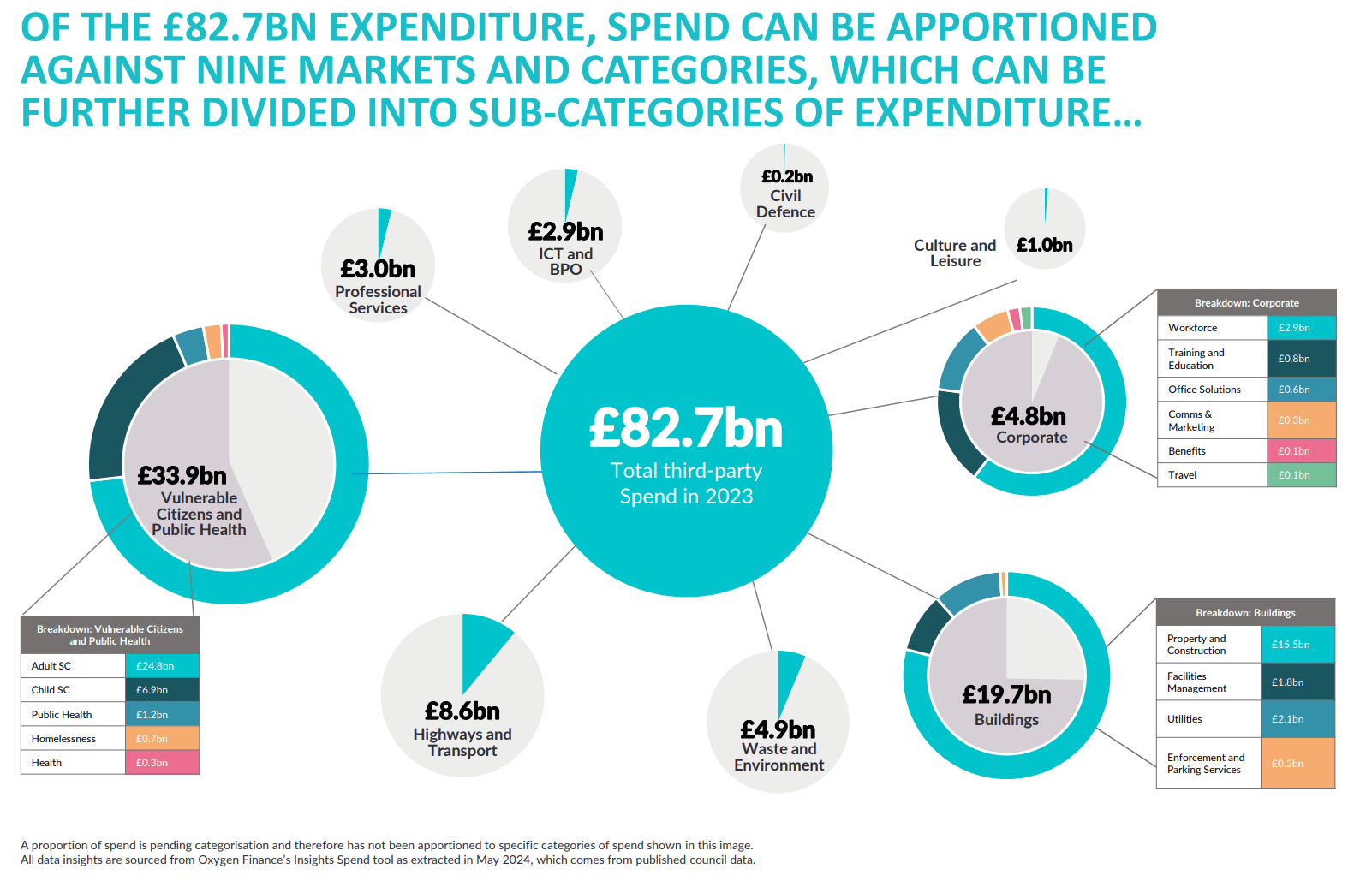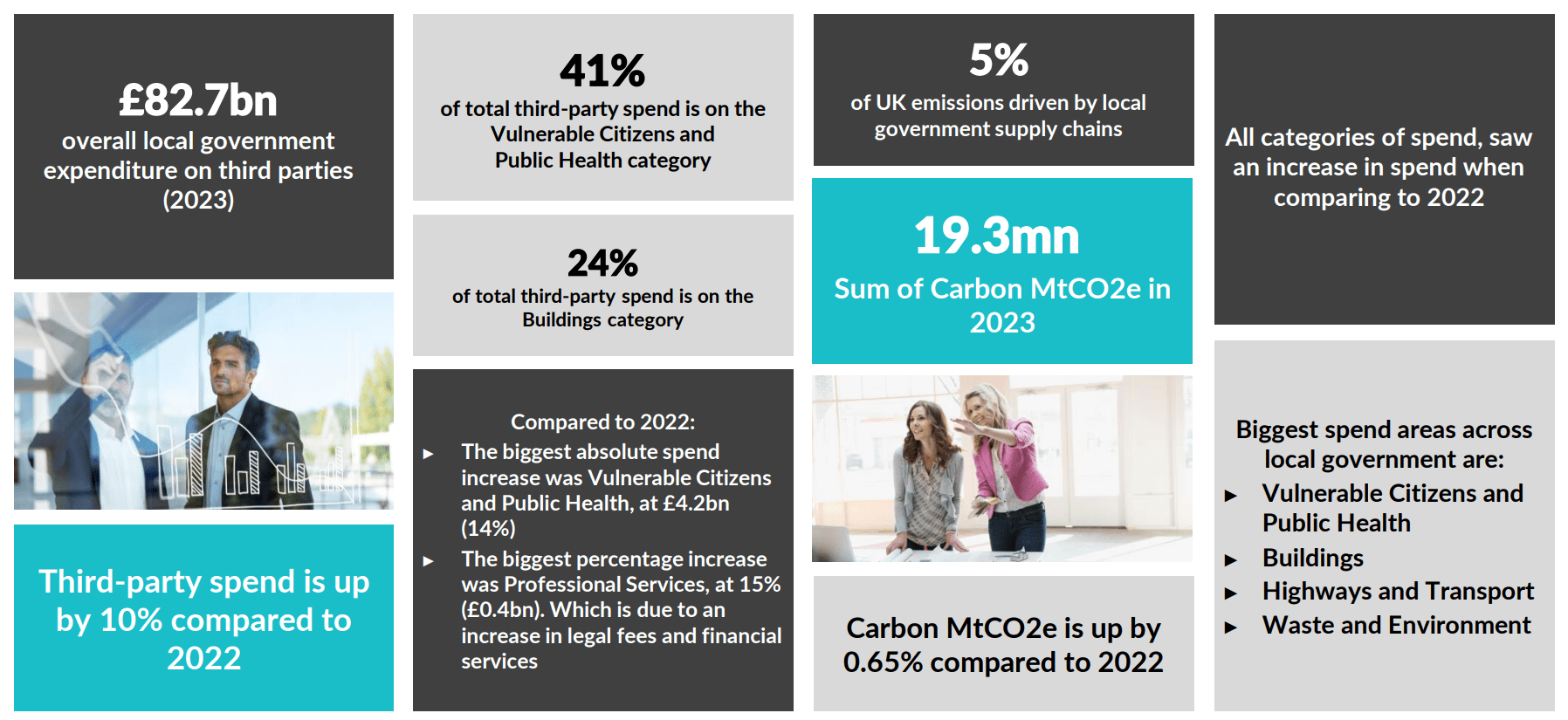Local Authority Third-Party Spend in England continues to rise at pace and is at £82.7bn, up by 10% across 2023 when compared to 2022 and 17% when compared to 2021 spend. Inflation averaged 7.3% across 2023 and 9.1% in 2022, showing that spending with third parties increased in absolute and real terms over the 2-year period.
Data released by Oxygen Finance shows the two categories that contribute the most to 2023 spend are Vulnerable Citizens & Public Health and Buildings. Vulnerable Citizens & Public Health now represents 41% of total third-party spend at £33.9bn and saw the biggest absolute spend increase, rising by £4.2bn in 2023, an increase of 14%
The rate of increase related to CO2 emissions slowed, with local government supply chain contributing an estimated 5% of overall UK emissions, with the majority of spend categories seeing a reduction from 2021 figures.
The data appears in the Local Government Third-Party Spend Almanac 2024, which gives a definitive view of expenditure and Carbon emission data across local government in England, providing local authorities with that can be used to optimise procurement and commissioning activities to achieve best outcomes.
A total of £33.9bn was invested in Vulnerable Citizens and Public Health (VC&PH) in 2023. Adult Social Care continues to be the highest spending subcategory (£24.8bn) within VC&PH, accounting for 73% of total category spend, and is driven by higher spend on Residential Care (Elderly) – £8bn, Residential (SEN, Disabilities, MH etc) – £4.3bn, and Health & Social Care (General) – £3.9bn.
Building spend is up by £1.2bn in 2023 compared to 2021, which is a 7% increase. The largest % change in spend within this category, in 2023 compared to the previous year category, is unsurprisingly on Utilities (21%), driven by higher spend on Electricity, Energy & mixed utilities, and Gas.

Waste and Environment, Buildings, and Highways & Transport category suppliers dominate the highest spend supplier list. Total spend with the top 20 suppliers exceeded £8.2bn in 2023; this is approximately 10% of the total third-party spend.
As councils continue to aim for net zero, it is estimated that the increase in supply chain emissions across local government in 2023 compared to 2022 was 0.65%, with most emissions categories seeing a decrease from 2021 figures. Local government supply chain emissions fell from 6% to 5% of overall UK emissions in 2023.
Prof. Richard Simmons Professor of Public and Social Policy, University of Stirling, and Academic Chair, CPO Advisory Forum commented on the Almanac findings, “The high proportion of overall local government expenditure directed to third parties, and the continued growth of this spend, further underscores the critical role of procurement and commissioning in local government; ensuring demand is met within a landscape marked by inflation, supply chain disruption, and environmental challenges. Alongside this, there is the implementation of the Procurement Act 2023.
“The procurement function must navigate these complexities while ensuring accountability, value for money, and the promotion of social value initiatives. Ultimately, delivering successful third-party services will hinge on effective supplier relationship management and robust collaboration among local government, suppliers, and stakeholders. By enhancing the strategic role of procurement teams, we can strive towards a more sustainable, equitable, and resilient future.”
Download your copy: Local Government Third-Party Spend 2024 Almanac – Oxygen Finance (oxygen-finance.com)

Notes:
All data insights are sourced from Oxygen Finance’s Insights Spend tool as extracted in May 2024.
The Almanac is based on data for all invoices over £500 published by councils in England and shows that spending increased in 2023 in both absolute and real terms.




